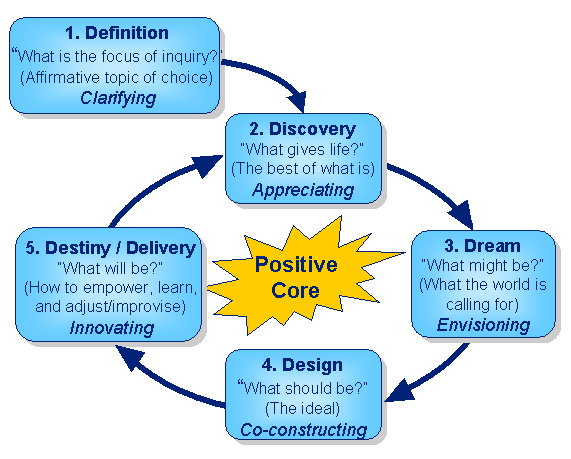
A synthesis prepared by Susan Donnan, December 2005
Appreciative Inquiry (AI) is a fully affirmative and inquiry-based process for change and transformation developed by David Cooperrider and his colleagues at Case Western Reserve University from 1980-1986.
AI is based on the deceptively simple premise that human systems grow in the direction of what we repeatedly ask questions about and focus our attention on. It is the study and exploration of what gives life to human systems when they function at their best.
Instead of asking "What are the root causes of failure or defect?", we ask "What are our root causes of success?" Evidences suggest that questions and dialogues about strengths, successes, values, hopes and dreams are themselves transformational.
The following is a comparison between the traditional Problem-Solving approach and the Appreciative Inquiry approach to change:
| The Problem-Solving Approach | The Appreciative Inquiry Approach |
|---|---|
| There is some ideal way for things to be. | The way things are are socially constructed by our system and can be changed |
| If a situation is not as we would like it to be, then it is a "problem" to be solved. | In any situation, we can find the seeds of excellence to build on. |
| The way to solve a problem is to break it into parts and analyse it. | We build excellence by seeking out examples and sharing stories of exceptional performance throughout our system. |
| If we find a broken part and fix it, the whole will be fixed. | As we create images of excellence, our system will move toward that image. |

The 5-D Cycle can be used to guide a conversation, a large group meeting, or a whole-system change effort. It can serve as a framework for personal development or coaching, partnership or alliance building, and large-scale community or organisation development. Whatever the purpose, the 5-D Cycle serves as the foundation on which change is built.
During the Definition phase, we choose the topics of inquiry that become the organisation's agenda for learning and innovation. The questions ask must be affirmative and focused on topics valuable to the people involved and directed at topics, concerns, and issues central to the success of the organisation.
The following are examples of how deficit issues can be reframed into affirmative topics:
| Deficit Issues | Affirmative Topics |
|---|---|
| Customer dissatisfaction | Customer delight |
| Debilitating bureaucracy | Inspiring democracy |
| Sexual harassment | Exceptional cross-gender partnerships in the workplace |
| Cross-functional conflict | Cooperation without boundary |
| Low morale | High motivation |
| High Turnover | Magnetic connection |
| Grievance reduction | Enthusiastic engagement and positive energy |
| Lost luggage | Exceptional customer arrival experience |
The Discovery phase is an extensive and collaborative search for "the best of what is" by focusing on times of organisational excellence. Discovery involves meaningful conversations among many or all members of an organisation including external stakeholders, "best in class" benchmark organisations, and members of the organisation's local community. A key result of this process is a rich description of the organisation's positive core - it's tangible and intangible strengths, capabilities, resources, and assets.
The Dream phase is an energising exploration of "what might be" by expanding on "the best of what is." It is a time for people to collectively explore their hopes and dreams for the kind of organisation and world they want to work and live in. The outputs of the Dream phase include creative images of the future and "macro" possibility statements.
The Design phase is about co-constructing the "grounded" vision of the future created in the Dream phase. Design activities include detailed description of the social and technical infrastructures for the organisation that will bring the future alive. Key outputs of this phase are "micro" possibility statements that articulate the organisation's dream for each of the organisation's ongoing activities.
The Destiny phase focuses specifically on personal commitments, organisational commitments, and paths forward for innovating "what will be." The result of Destiny is generally an array of changes to the organisation's social and technical infrastructure in areas as diverse as management practices, HR processes, measurement and evaluation systems, customer service systems, work processes, structures, and technologies. At the end of the Destiny phase, many organisations begin the Appreciative Inquiry 5-D Cycle anew.
Since its inception in the early eighties, Appreciative Inquiry has been used successfully across the globe in both profit and non-profit settings for organisational and social changes of greater and greater scale.
| Business | Non-profit & Government |
|---|---|
|
|
The following are change agendas suited to Appreciative Inquiry:
| Change Agenda | Examples |
|---|---|
| Organizational Change |
|
| Inter-Organisational Capacity Building |
|
| Community Development |
|
| Global Transformation |
|
| Small Group Development |
|
| Inter-Group Change |
|
| Personal/Relational Transformation |
|
This article draws heavily on the existing body of knowledge on Appreciative Inquiry by David Cooperrider, Bernard Mohr, Diana Whitney, Jane Watkins, and others in the field.